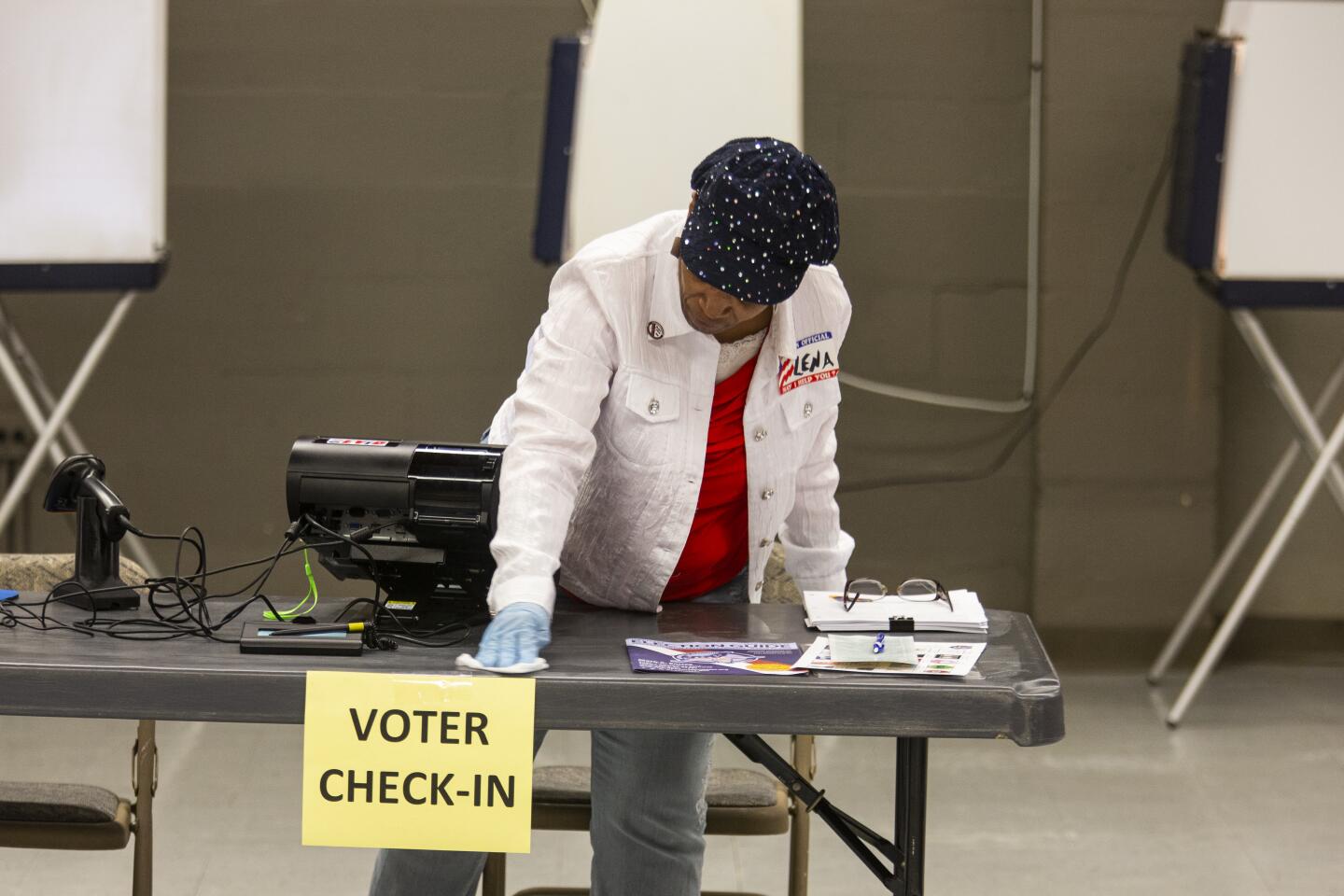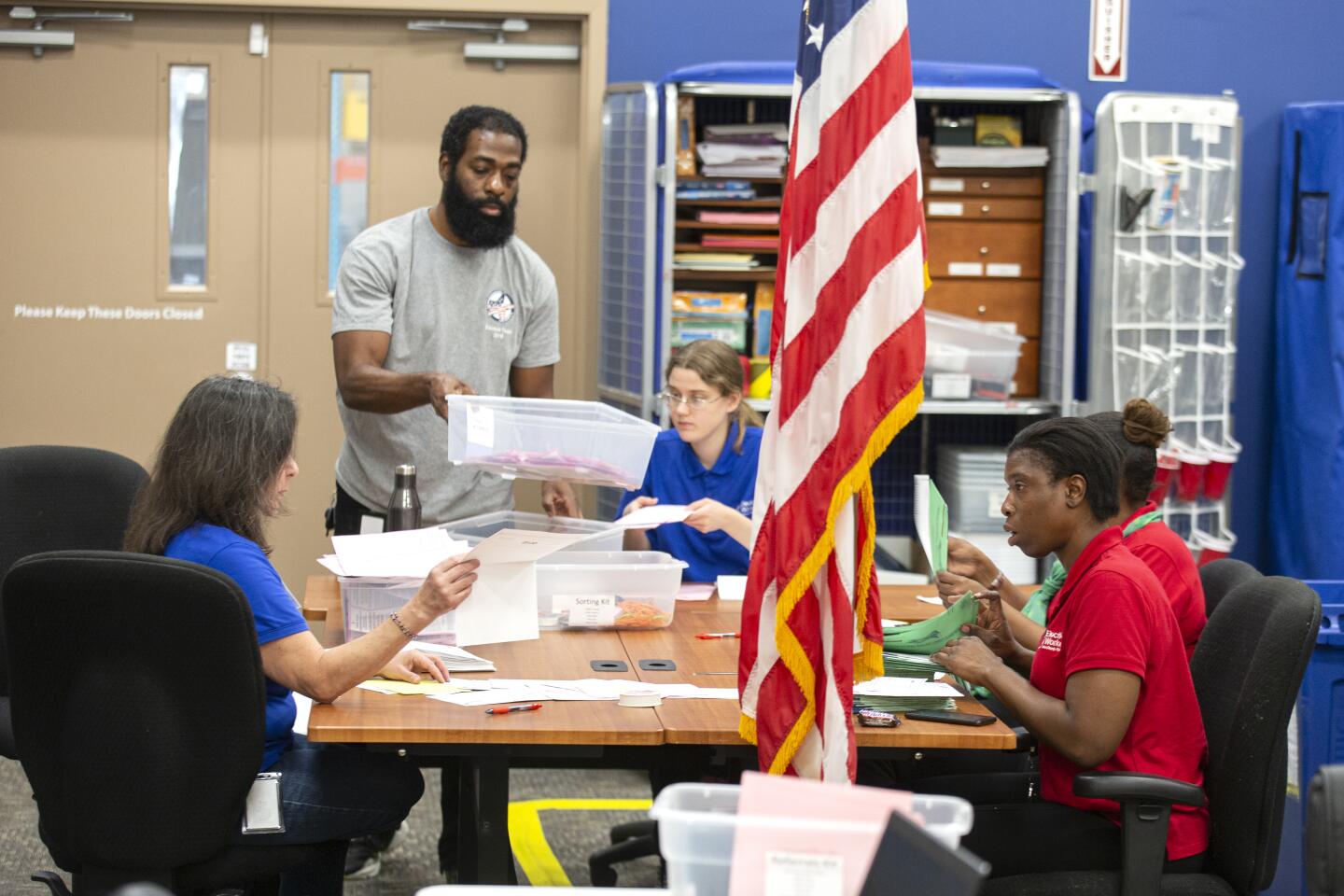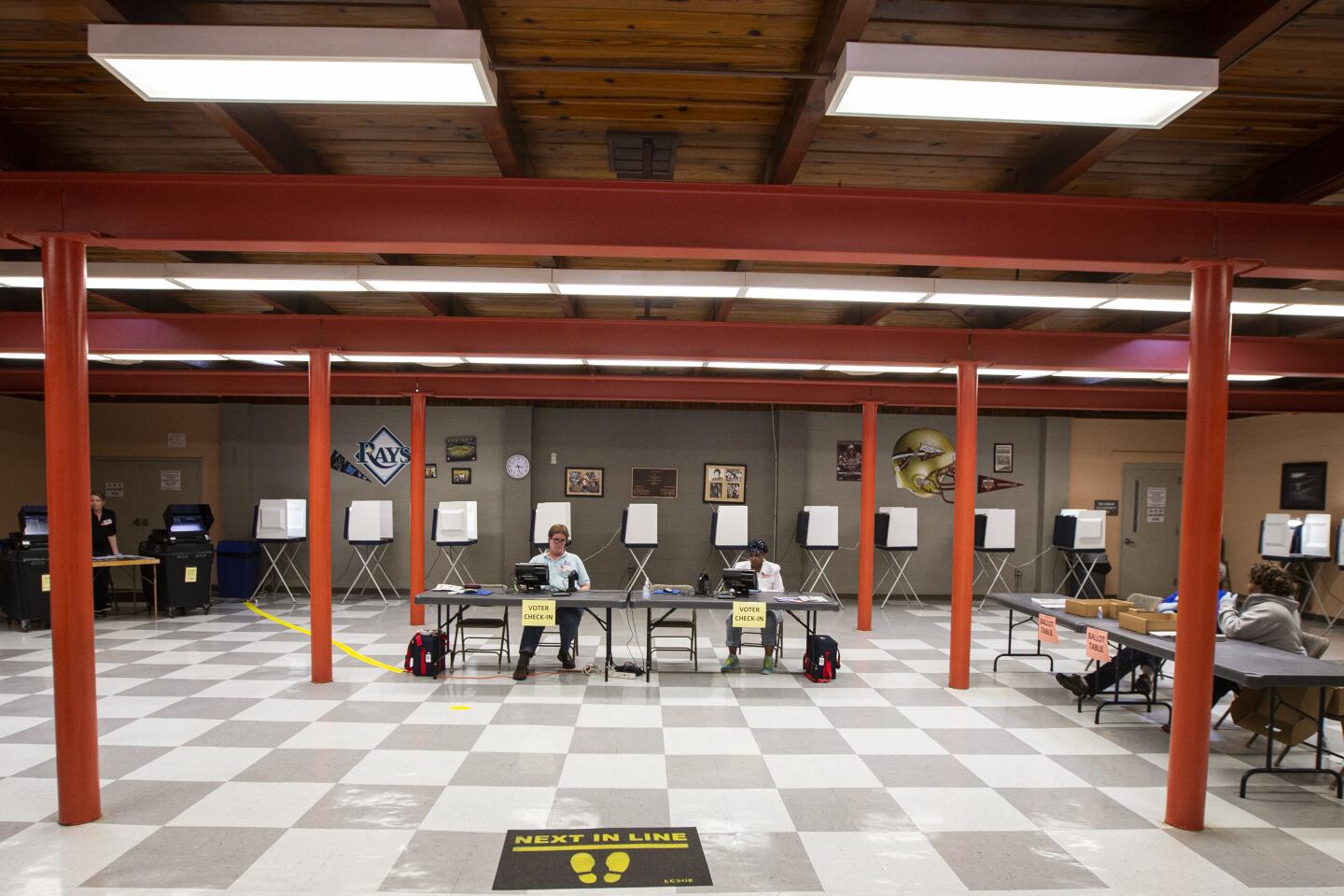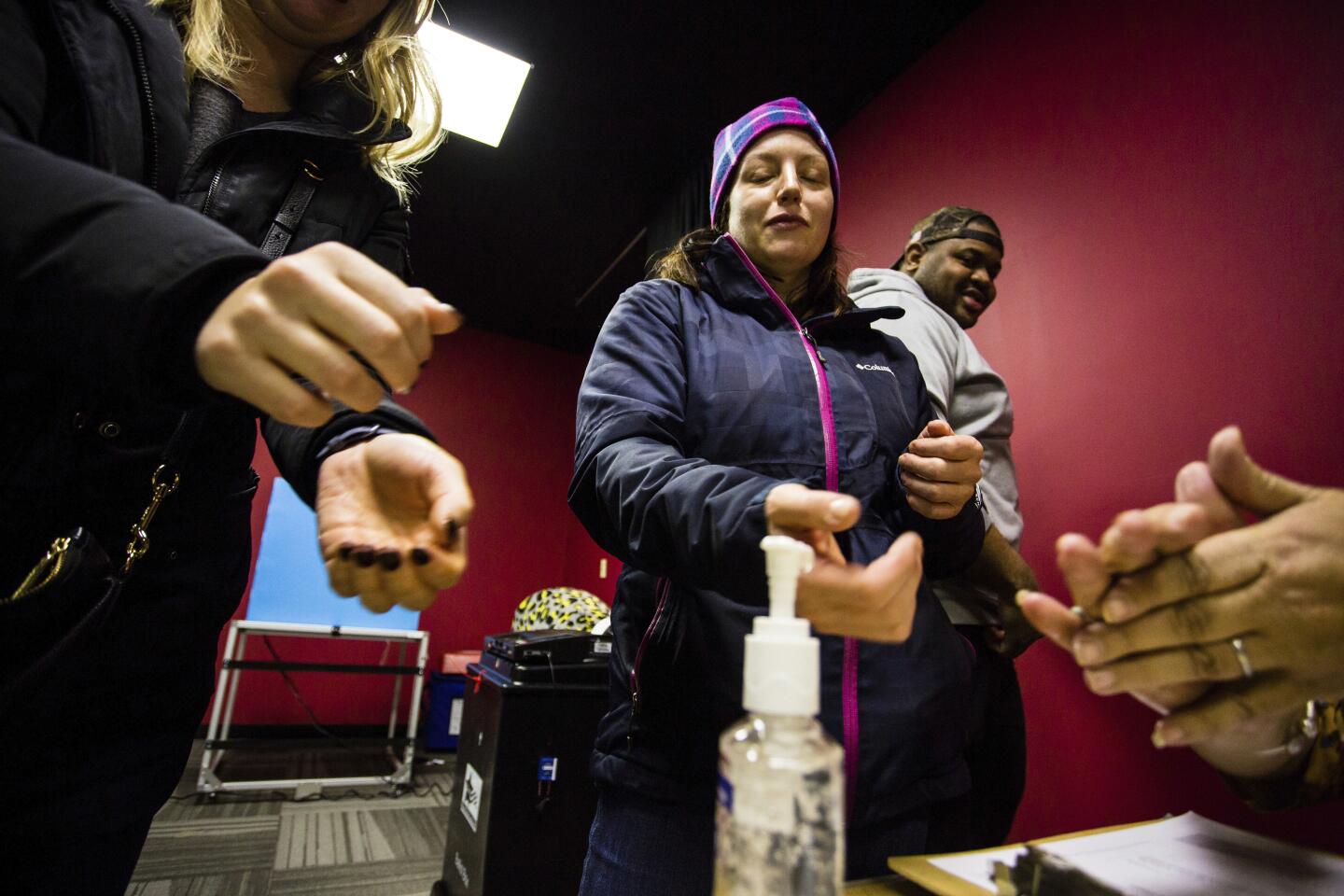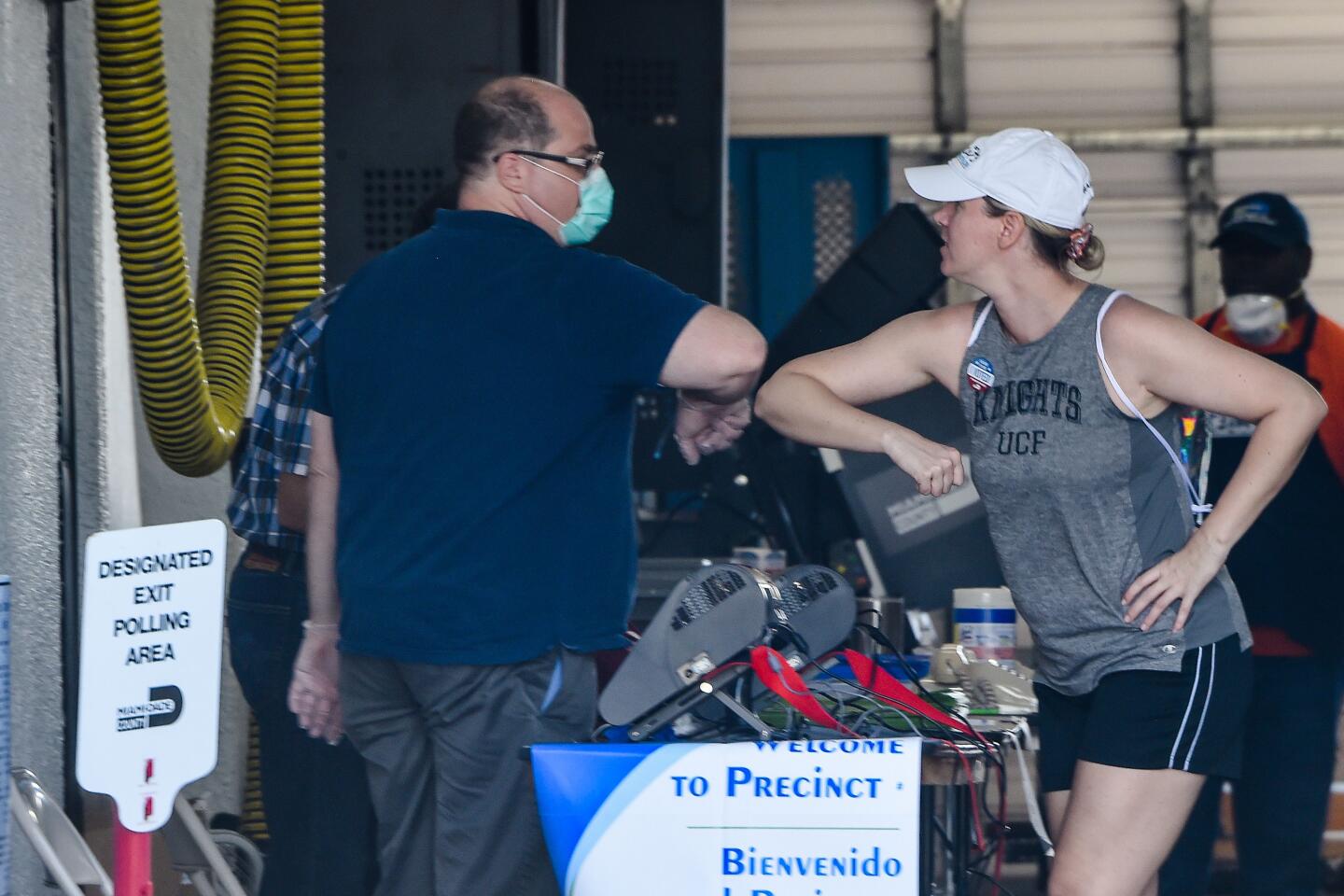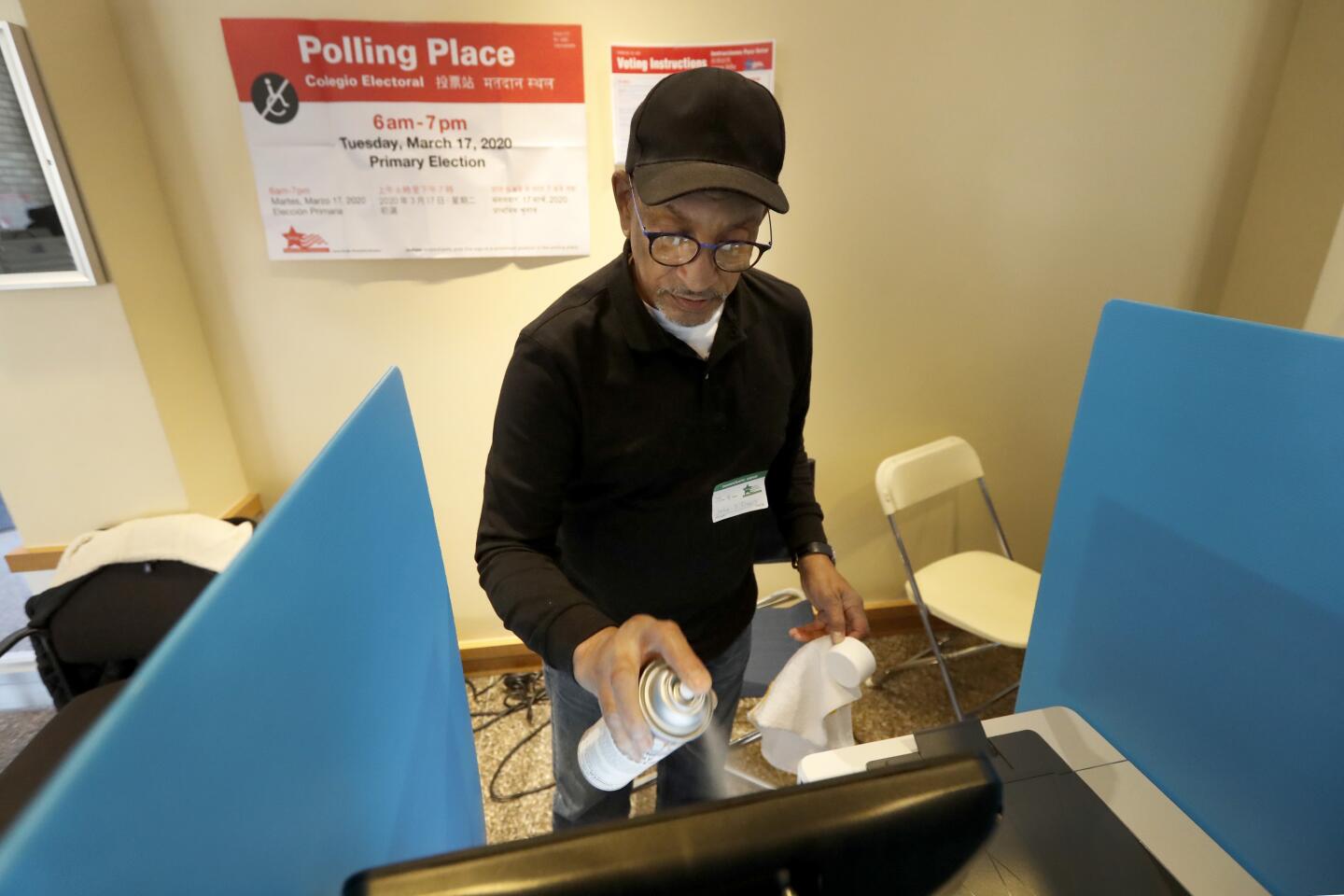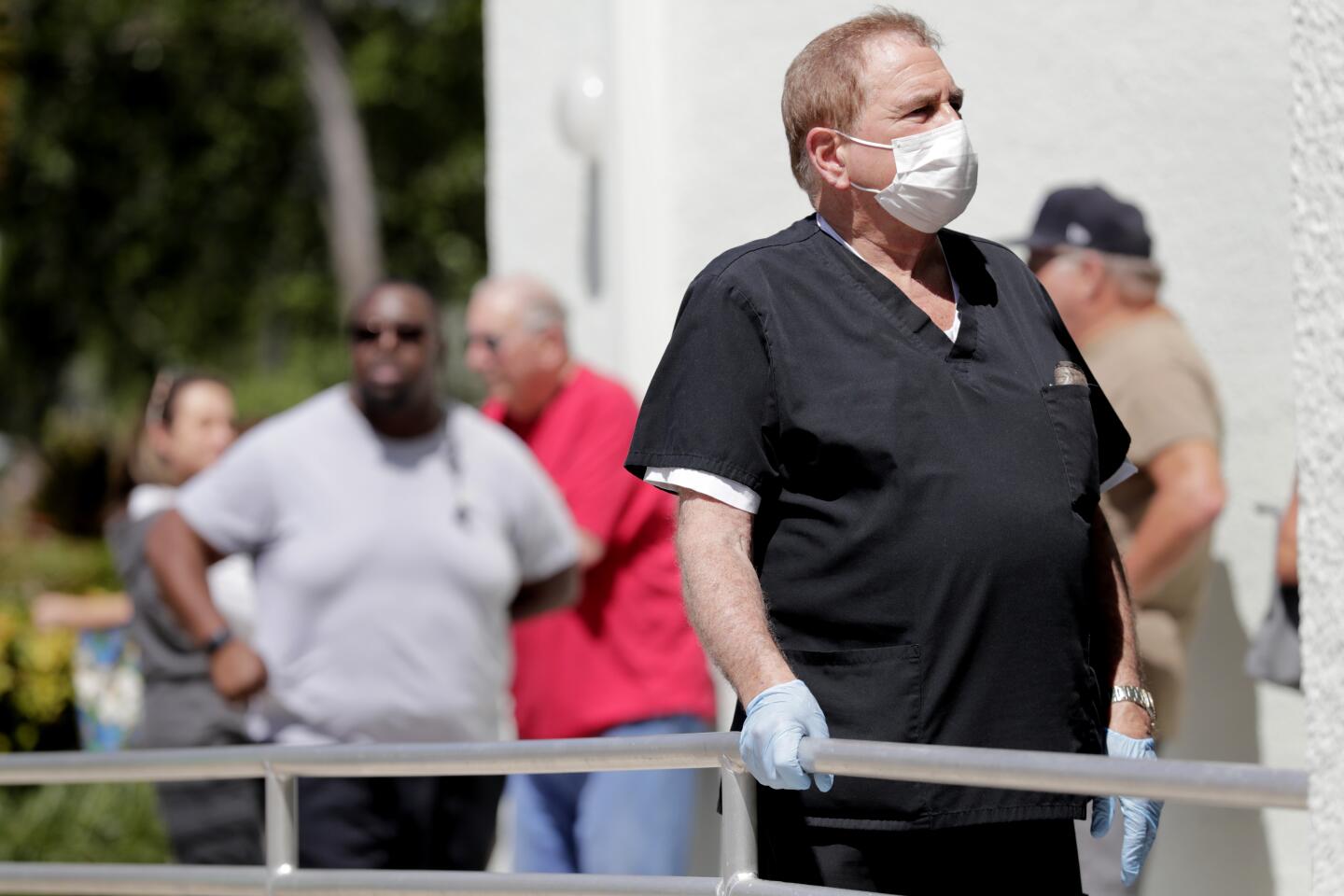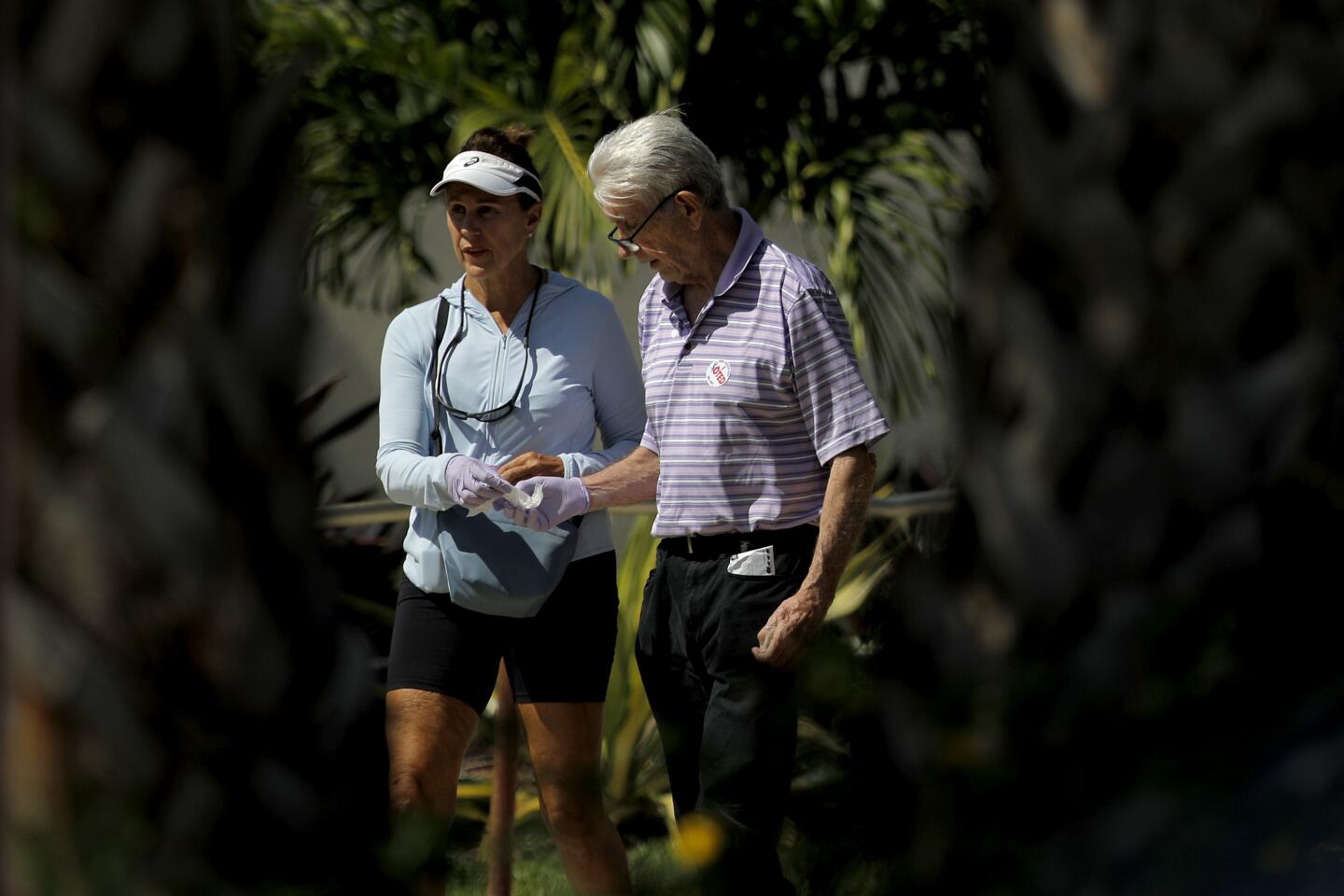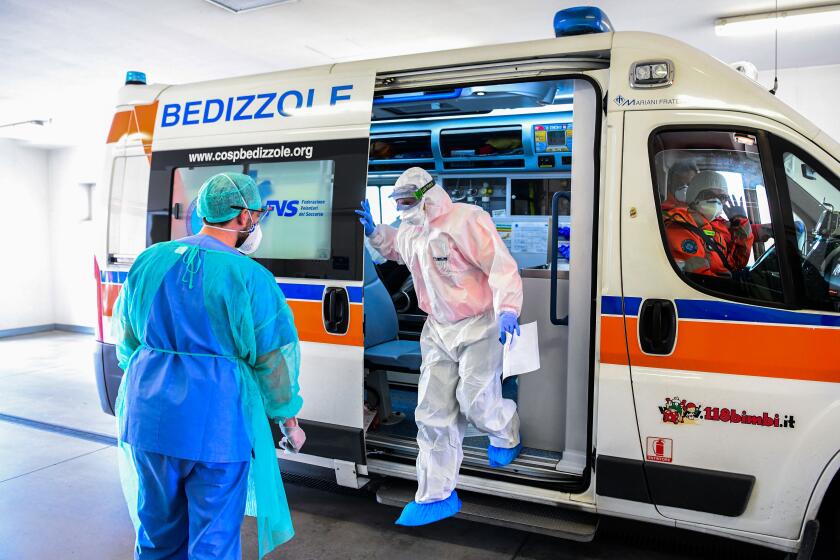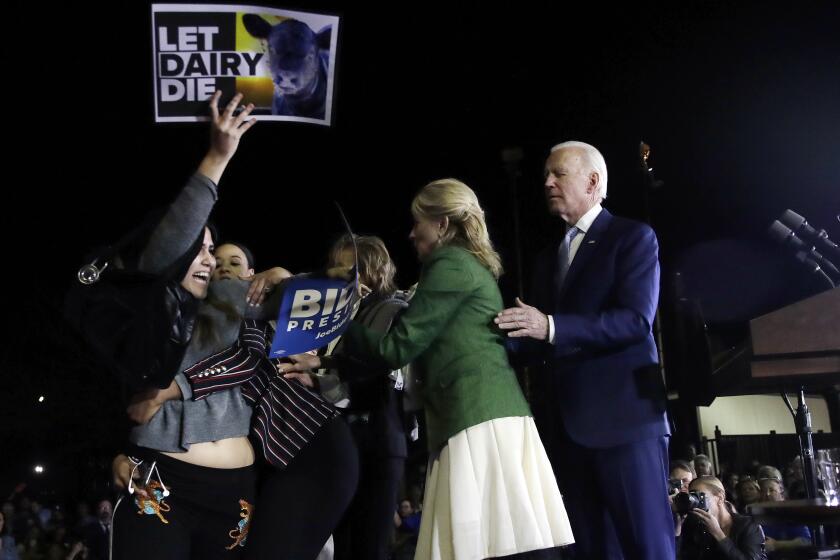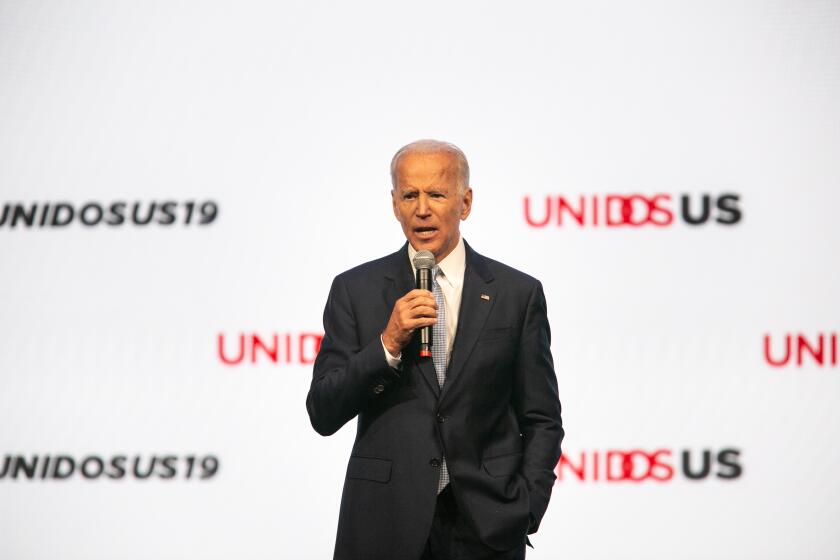Coronavirus upends primary elections in Florida, Illinois and Arizona; vote postponed in Ohio
- Share via
The new coronavirus kept some voters and poll workers at home and hampered efforts to open some polling sites on Tuesday as three states held Democratic presidential primary contests amid a global pandemic.
Leaders in Ohio called off their primary just hours before polls were set to open as the federal government urged Americans not to gather in groups of 10 or more and asked older people to stay home. The state’s Democratic Party said it was weighing options for challenging that move, which the Republican governor had pushed.
In Florida, at least five polling stations in Palm Beach County couldn’t open because workers didn’t report for duty, the county elections department said. The county had 800 volunteers back out as of Monday, with 100 new volunteers offering to take their place.
And a coalition of voting-rights advocacy groups filed a lawsuit seeking to extend mail voting in the state’s primary by 10 days out of concerns that the coronavirus has kept voters from the polls on election day. But a federal judge rejected the groups’ request for an order allowing Florida voters to request a mail-in ballot through March 24 and postpone the count until March 27.
“At this hour, with voting in progress, a temporary restraining order would be adverse to the public interest,” Judge Robert Hinkle of U.S. District Court in Tallahassee wrote in a ruling on Tuesday. He added: “The national healthcare emergency is not a basis to cancel an election.”
At the same time, Hinkle raised the possibility of allowing more voting after the polls close Tuesday, saying a future order would set “procedures going forward.”
In Illinois, Cook County Clerk Karen A. Yarbrough took to Twitter on Tuesday morning to encourage poll workers to mark space on the floor at polling sites to keep voters a safe distance apart and avoid spreading the virus. The tweet included a photo of a roll of blue tape, a piece of string and a tape measure along with a note that concludes: “THIS PICTURE CAN SAVE LIVES.”
Ami Gandhi, senior counsel at the Chicago Lawyers’ Committee for Civil Rights, said the group was fielding an unprecedented volume of calls from voters confused about where to vote or unsure whether they should leave their homes to cast ballots. The limits on social contact was a source of widespread trouble for residents of nursing homes as election officials grappled with how strictly to adhere to the rules about voting.
“The normal procedures around this are simply not sufficient, and our most vulnerable community members are getting disenfranchised,” Gandhi said.
In some cases, polling stations were moved out of nursing homes where the residents normally vote. But that risk-reducing step was taken too late for residents to apply for mail-in ballots, and public-health protocols made it tough for them to get assistance, she said. Voting machine malfunctions and misrouted polling supplies also caused problems in Illinois.
“If it wasn’t so tragic, it would be comical, the numbers of errors we’re seeing today,” Gandhi said.
The latest updates from our reporters in California and around the world
A Chicago election spokesman said there was a scramble to relocate about 50 polling places that said at the last minute that they would not be available for use on primary day. The delivery of election equipment had to be shifted to new sites Tuesday, delaying their opening. It was unclear how many of the new sites were up and running. No reason was given for the cancellations.
Board of Election Commissioners spokesman Jim Allen said turnout was slow early in the morning, likely due to people working from home because of the coronavirus.
Allen says he would call “conducting an election during a global pandemic when people are afraid to go to a polling place a curse.”
Not since New York City postponed its mayoral primary on the day of the Sept. 11, 2001, attacks has an election been pushed off in such a high-profile, far-reaching way. Ohio Gov. Mike DeWine initially asked a court to delay the vote, and when a judge refused to do so, the state’s health director declared a health emergency to prevent the polls from opening.
The election-eve maneuvers left many Ohio voters bewildered or angry after they woke up not knowing whether they should go to polling stations to cast ballots, said Kristen Clarke, president and executive director of the Lawyers’ Committee for Civil Rights Under Law.
“What played out in Ohio over the last 18 hours is deeply disturbing,” she said, suggesting state leaders should have finalized election adjustments sooner. “Sheer chaos has resulted from the state’s 11th-hour decision to postpone the election, and it’s unlike anything we have seen before.”
Some Ohio voters showed up at closed polling places. Certified public accountant Brian Anaya walked up to his polling place early Tuesday morning only to learn the election had been called off.
Anaya told the Columbus Dispatch he heard about a judge’s ruling that the election would go forward but not that the state health director had closed the polls on the grounds of a health emergency.
At a news briefing in Columbus on Tuesday, DeWine said this was “no ordinary time in the United States, and so we have to preserve all the constitutional rights.
“It would have been wrong to compel people to make a decision today, whether they were going to risk their health, compromise health, risk their health to exercise their constitutional right,” he said. “That is wrong.”
The election is playing out as the virus’ impact is becoming more tangible with schools closing across the country, workers staying home, restaurants and bars shuttering and the stock market plunging.
The rapidly shifting developments amounted to a kind of chaos rarely seen in an election season. And it may not end soon as some states that have presidential contests in the coming weeks have already moved to postpone them and others were being pressed to follow.
“These are unusual restrictions,” Susan Lerner, executive director of Common Cause New York, said of recommended federal limits to try to control the spread of the virus. Her group is urging the delay of that state’s 2020 presidential primary from April 28 to June 23, when congressional and legislative primaries are already scheduled.
“Normally, we do not support postponing elections, but these are extraordinary circumstances,” Lerner said.
The U.S. Secret Service says Democratic presidential candidate Joe Biden is receiving its protection beginning this week.
In Arizona, the vast majority of the state’s 1.2 million registered Democrats cast ballots early by mail, but about 300,000 can vote in person Tuesday.
At a polling place at a Lutheran church in Phoenix, a steady stream of voters arrived during an hour’s span Tuesday morning. At times, several had to wait at the door before being allowed to enter after other voters left the building.
Former Vice President Joe Biden is moving closer to securing the Democratic presidential nomination but could face a setback if the older voters who tend to support him don’t show up. Vermont Sen. Bernie Sanders, meanwhile, can’t afford to lose support from young voters who have been his most loyal supporters.
Kate Bedingfield, Biden’s deputy campaign manager, released a memo arguing that the strong turnout of Democrats who voted by mail or cast ballots at early voting centers would ensure that results Tuesday will reflect the full electorates of the three states.
“We held elections during the Civil War, the 1918 flu pandemic, and World War II,” she wrote. “We are confident that we can meet that same challenge today and continue to uphold the core functions and values of our democracy.”
On Twitter, Biden encouraged Democrats to vote Tuesday by curbside if they could. “If you vote in person, please wash your hands, don’t touch your face, and stay 6 feet from others in line,” he said. For his part, Sanders tweeted that “going to the polls amid the coronavirus outbreak is a personal decision and we respect whichever choice voters make.”
Sanders’ team had expected Biden to do well on Tuesday. But the Vermont senator has also cast some doubt about the entire process, saying no one should risk being infected while voting and noting that it’s important “to make sure that everybody who wants to vote has the right to vote, and that may not be the case now.”
Still, Sanders faces an increasingly tough path to the nomination. About half of the delegates in the Democratic primary have already been awarded. Sanders trails Biden by more than 150 delegates nationally, meaning he’d need to win more than 57% of those yet to be allocated to clinch the Democratic nomination.
Latinos have mostly been backing Bernie Sanders. If Joe Biden secures the Democratic presidential nomination, he’ll need those voters against Trump.
The coming weeks will present additional uncertainties. After Tuesday, the campaign had been set to shift to Georgia next week, but officials there have already postponed their Democratic primary until May 19. That means voting isn’t scheduled again anywhere until March 29 in Puerto Rico — and island officials are also seeking a delay.
Maryland Gov. Larry Hogan on Tuesday postponed the state’s April 28 primary to June 2.
The first week in April, meanwhile, would have featured Louisiana, but its decision to delay its primary until June 20 leaves only primaries in far-flung Alaska and Hawaii and caucuses in Wyoming through April 4. That could leave the campaign in further limbo, perhaps prolonging a primary race that might otherwise have been wrapped up.
Tom Perez, the chairman of the Democratic National Committee, urged states to stop postponing primaries “when timing around the virus remains unpredictable.” Instead, he urged them to make voting easier and safer, suggesting they expand access to vote by mail and early voting.
“The right to vote is the foundation of our democracy,” he said, “and we must do everything we can to protect and expand that right instead of bringing our democratic process to a halt.”
Times staff writers Michael Finnegan and Melissa Gomez contributed to this report.
More to Read
Get the L.A. Times Politics newsletter
Deeply reported insights into legislation, politics and policy from Sacramento, Washington and beyond. In your inbox three times per week.
You may occasionally receive promotional content from the Los Angeles Times.
